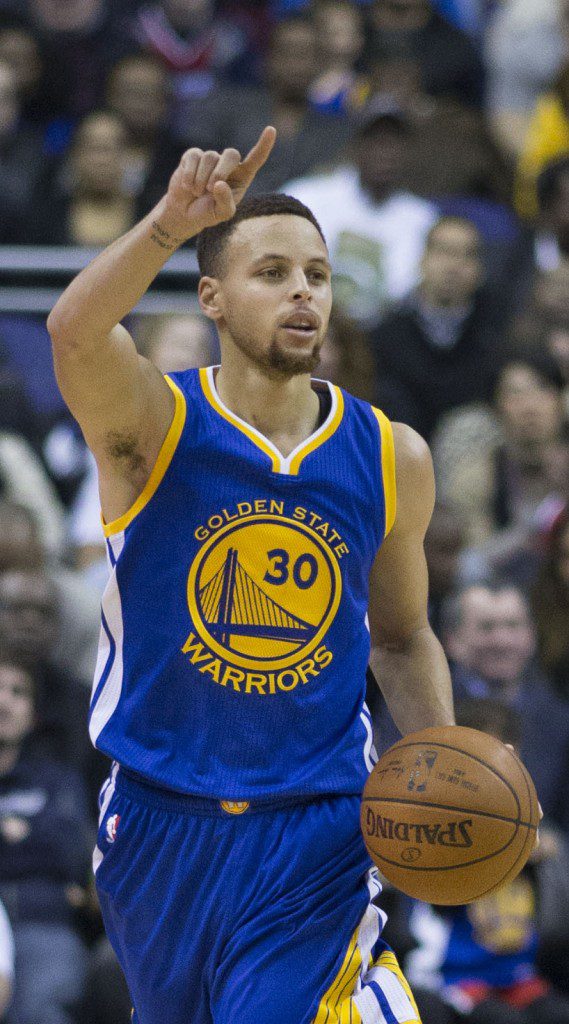
What can Golden State Warriors teach missionaries? A lot. But the lessons we can learn might differ from what you’d expect.
For those unfamiliar with NBA basketball, the Golden State Warriors over the past few seasons are the best team in the NBA (aside from their collapse in the Finals last year). The use a “run and gun” offense, which means they play a fast-paced game and attempt an incredible number of 3-point shots. They are exciting to watch. And they’ve won championships doing it.
However, some people think Warriors like Stephen Curry might hurt the game of basketball. Commentator Mark Jackson said this,
“Understand what I’m saying when I say this. He’s hurting the game,” Jackson said. “And what I mean by that is that I go into these high school gyms, I watch these kids, and the first thing they do is they run to the 3-point line. You are not Steph Curry. Work on the other aspects of the game.”
I’ve seen this dynamic myself when watching boys play basketball. But I’ve also seen this sort of behavior from missionaries.
Do Church Planters Hurt the Church?
Missionaries sometimes adopt a “run and gun” approach to church planting. Unfortunately, some missionaries do so the same way that high school kids imitate Curry and the Warriors.
The missionary equivalent to “run and gun” is what I’ll call the “rule of rapidity.” It has many incarnations with various names, such as “church planting movements” (CPM), the “church growth movement,” some forms of “disciple making movements” (DMM), Training for Trainers (T4). I’ve critiqued this philosophy of ministry first here and then here.
Here is the basic problem with approaches that emphasize rapidity above all else. By analogy, they suggest that church planters should only
(1) run fast breaks and
(2) shoot three-pointers.
After all, this theoretically would be the fastest way to score and win. Why waste your time setting up a play? Why use the low post? Pass the ball around? Run the clock down? And what if you ready yourself for an offensive rebound? Some people might accuse you of lacking faith. These things only slow down the advance of God’s kingdom.
If mission strategists and church planters take this perspective, they effectively tell others they should be like Stephen Curry, or more accurately, have results like the Apostle Paul (though people often misinterpret Paul’s own ministry). Like Mark Jackson, we need to say to many missionaries, “You are not Paul.” You might be a “Peter” (pastoral) or “Isaiah” (without converts) or “James” (persecuted) or who knows who else.
Doing ministry by the rule of rapidity would be like the Warriors only attempting 3-pointers. As good as they are and as exciting as it might seem, this would be foolish. It also is not actually why the Warriors are so successful.
Doing Ministry Like a Warrior
Getting beyond superficial interpretations of the Warriors’ play, we can learn a lot. Here are four lessons we can apply to doing ministry.
Passing
People don’t realize that the Warriors are an incredible passing team. They work together, freeing others for the best possible shot. It’s not simply Stephen Curry to contributes.
How many missionaries work as a team? Practically speaking, do teams simply exist for accountability or administrative purposes? I’ve heard from multiple sources that the main reason most missionaries leave the field prematurely is team conflict. Sometimes, the team leader has a “my way of the highway” approach. It’s all about his singular method and strategy.
On other teams, individuals work so separately that each hardly knows what the others are doing. I have often seen instance where people in the same organization, who lived in the same city, didn’t know anything about each other’s work, thus could not support one another and sometimes worked against each other.
Preparation
Just watch the video below to see why Stephen Curry is so good. His preparation, perseverance, and attention to detail are integral to his success.
Might missionaries and mission agencies have lower expectations for themselves than Curry has for himself? Might they be less methodical and intentional in their own training? Consider how little training or theological education the average missionary has?
Lawyers, doctors, and teachers all have ongoing education requirements, but not missionaries. For too many, the most rigorous books they read are leadership books from John Maxwell. Rigorous theology or missiology is just not on their radar.
Perspective
Before Steve Kerr became the coach of the Warriors, the team depended too much on Stephen Curry. Kerr changed up their offense; they didn’t do old-school isolation plays. They developed themselves as a team with diverse repertoire.
Likewise, missionaries should re-evaluate the tools they use. They need not live-and-die with one tool or one strategy, whether T4T, C2C, DMM, Two Ways to Live, etc. Look at the people around you. How might others on your team, national partners, or other like-minded workers contribute to the overall mission effort, especially in ways that you might be less skilled in or passionate about? How are you diversifying your own ministry approach to address multiple types of needs and people?
People
The Warriors are people, not machines. Kerr tries to help the team have fun. He doesn’t run them into the ground in the name of “hard work.”
Not so in many mission groups. Burn out if a huge deal. Often, missionaries feel the greatest pressure from their agencies, supervisors, and sending churches. It’s easy to hyper-focus on the task and forget that missionaries are people. What’s more, the nationals with whom missionaries work are also people. Many Chinese feel like missionaries see treat them more like “projects” rather than friends.

















